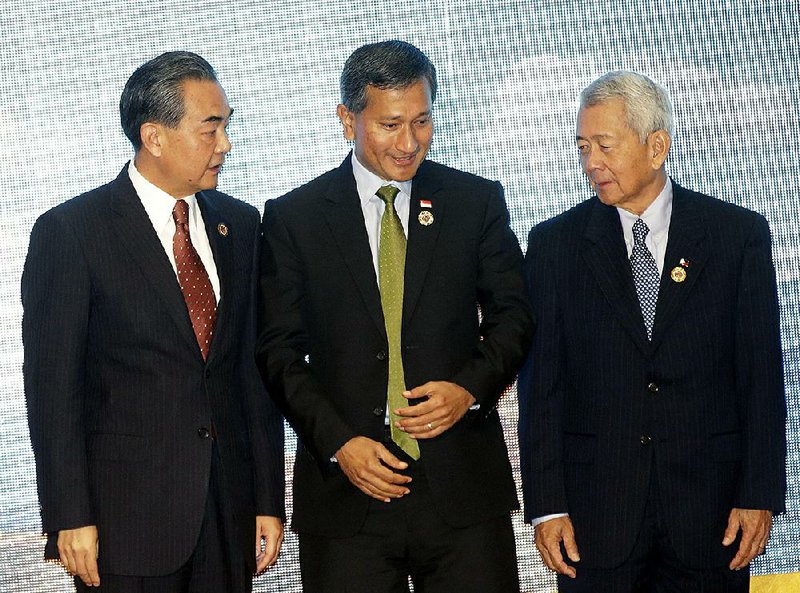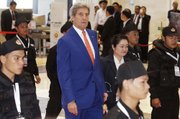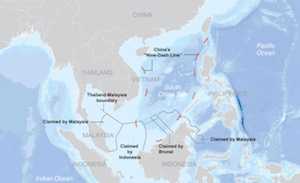VIENTIANE, Laos -- China scored a diplomatic victory Monday, preventing Southeast Asia's main grouping from criticizing it for territorially expanding in the South China Sea, even though some of the bloc's members are victims of Beijing's actions.
After hectic negotiations, the 10 members of the Association of Southeast Asian Nations issued a watered-down rebuke that amounted to less than a slap on the wrist and exposed the deep divisions in a regional body that prides itself on unity.
In a joint communique released after their talks, the foreign ministers of the association said only that they "remain seriously concerned over recent and ongoing developments" in the South China Sea. The statement did not mention China by name in referring to the developments.
It failed to mention a recent ruling by an international arbitration panel in a dispute between the Philippines and China that said Beijing's claims in the South China Sea were illegal and that the Philippines was justifiably the aggrieved party. China has dismissed the ruling as bogus, saying the Hague-based tribunal has no authority to rule on what Beijing calls bilateral disputes. China wants direct negotiations with the Philippines instead.
The tribunal's award "amounts to prescribing a dose of wrong medicine ... and it seems that certain countries outside the region have got all worked up, keeping the fever high," Chinese Foreign Minister Wang Yi said, referring to the United States. "And if the prescription is wrong it will not help cure any disease. That's why we urge other countries in the region to lower the temperature," he told a news conference after 90 minutes of talks with the bloc's ministers.
China was able to push through its stance in the bloc with the help of Cambodia, and to some extent Laos, both of which are close friends of Beijing. The group's guiding principle is to make all statements by consensus, so a veto by Cambodia would have prevented a more stinging rebuke.
"We reaffirmed the importance of maintaining and promoting peace, security, stability, safety and freedom of navigation in and over-flight above the South China Sea," the joint statement said.
Such statements have previously been issued, notably after an summit in California in February, and have led to criticism that the group is becoming a toothless organization.
Later on Monday, Secretary of State John Kerry urged the divided nations to forge a consensus on how to address disputes in the South China Sea, appealing to them to embrace a rules-based international system to resolve those differences peacefully.
In a meeting with the Lao foreign minister, whose country currently holds the rotating chairmanship of the bloc, Kerry "urged ASEAN to reach consensus and issue a joint statement on the arbitral tribunal's recent ruling on the South China Sea," according to the State Department.
Addressing the foreign ministers of all 10 bloc members, Kerry stressed the importance of complying with "a rules-based international system that protects the rights of all nations whether big or small." He wrapped up his brief public remarks to that meeting by noting "how much can be accomplished when we work together, invest in the future, and perhaps most importantly support the rules-based system that has led to steadily increased peace and prosperity for nearly 50 years now."
In a meeting with Wang on the sidelines of the larger conference on Monday, Kerry noted that China and the United States must continue to manage their differences in a mature way. Their meeting took place as President Barack Obama's national security adviser Susan Rice was visiting Beijing to cover some of the same issues.
Also on the sidelines of the conference in Laos, Kerry met the foreign ministers of Japan and Australia and all three expressed "serious concerns" about the South China Sea disputes and Chinese land reclamation in contested areas.
Meeting with Chinese President Xi Jinping, Rice said the U.S. and China's interdependence meant that China's success was also in America's interest, and said the two nations have demonstrated that they can work together on major global issues such as climate change.
"At the same time, we are confronting our differences with candor and clarity and we believe that clarity produces predictability, and predictability produces stability," Rice said.
A statement issued later by the White House said that Rice discussed with China's top diplomat, State Councilor Yang Jiechi, U.S. views on human rights, maritime issues, and the treatment of U.S. businesses and nongovernmental organizations operating in China.
Information for this article was contributed by Jim Gomez, Matthew Lee and Gillian Wong of The Associated Press.
A Section on 07/26/2016


